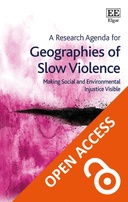Explore

A Research Agenda for Geographies of Slow Violence
0 Ungluers have
Faved this Work
Login to Fave
Elgar Research Agendas outline the future of research in a given area. Leading scholars are given the space to explore their subject in provocative ways, and map out the potential directions of travel. They are relevant but also visionary.
This timely Research Agenda highlights how slow violence, unlike other forms of conflict and direct, physical violence, is difficult to see and measure. It explores ways in which geographers study, analyze and draw attention to forms of harm and violence that have often not been at the forefront of public awareness, including slow violence affecting children, women, Indigenous peoples, and the environment.
Demonstrating a range of research methods and theoretical perspectives, this Research Agenda looks at the topic of slow violence through qualitative fieldwork, document analysis, geospatial technologies and cartographic analysis and representation. Key case studies consider slow violence in the form of social injustice, environmental alteration, and harmful human-environment interactions. The chapters also highlight how physical infrastructure, social and legal practices, places that have experienced armed conflict, and groups of people being labeled or marginalised can foster forms of slow violence.
Scholars and students of human geography, particularly those looking at decolonization, environmental and social justice and different geographic methods for research, will find this book to be a beneficial read. It will also be useful for those studying structural harm and indirect violence more widely.
This book is included in DOAB.
Why read this book? Have your say.
You must be logged in to comment.
Rights Information
Are you the author or publisher of this work? If so, you can claim it as yours by registering as an Unglue.it rights holder.Downloads
This work has been downloaded 58 times via unglue.it ebook links.
- 58 - pdf (CC BY-NC-ND) at Unglue.it.
Keywords
- Decolonization
- dispossession
- Environmental justice
- Geographic methods
- JPSL
- Qualitative research
- RGC
- RGCP
- Social Justice
- Structural violence
- Violent discourse
Links
DOI: 10.4337/9781788978033Editions

